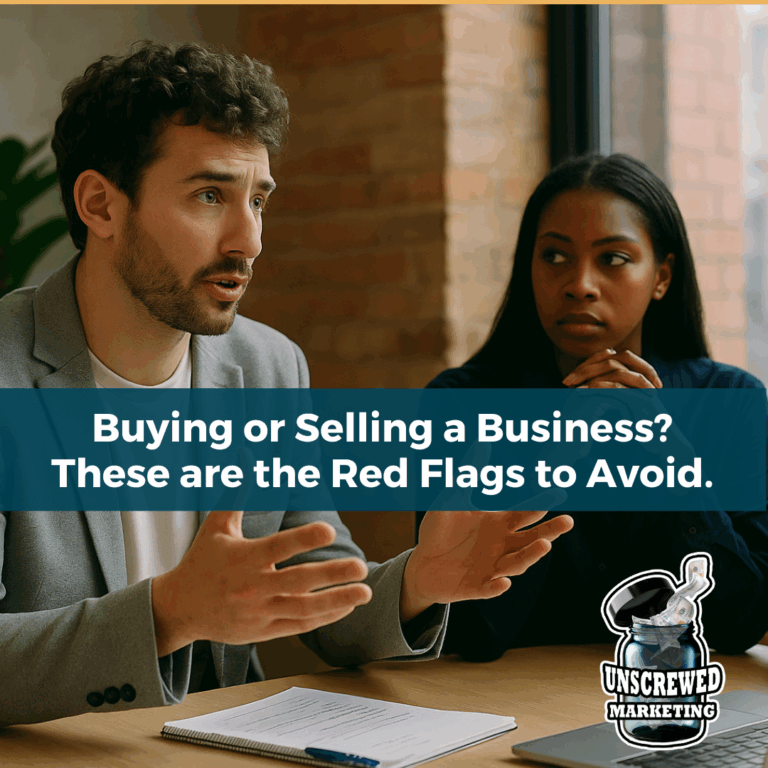- +1 512-591-8295
- [email protected]
- Mon - Fri: 9:00 - 16:00
- +1 512-591-8295
- [email protected]
- Mon - Fri: 9:00 - 16:00
Use code MOM50 at checkout thru Mother’s Day to get 50% off any gift card for marketing services

The other day I came across a post in a business group that honestly made me choke on my coffee. This happens more often than you may want to know.
A woman was trying to sell her online business—and she was very upfront:
“No clients, but it comes with the branding I did and documented processes.”
She was asking six figures. *insert coffee choke moment*
The “branding”. Looked like homemade Canva logo. A logo is NOT branding. Barely passable.
The systems? Probably a free SOP template from some $99 “coaching bundle.”
The website traffic? Nonexistent (she said this herself).
The revenue? Zero. For at least a year, according to her own comments. Never said if it had ever actually made a dime.
When I gently (okay, bluntly) pointed out that buyers usually want a business that actually makes money, she doubled down:
“You don’t understand. People will absolutely pay for the brand and systems already in place.”
Ymmmm … This isn’t a franchise. It’s a Canva file and a dream. And yeah I understand, I have an MBA and decades of high level marketing and business experience including working on some mergers and acquisitions. Her experience … a Canva logo and a purchased SOP.
Let’s break this down—for both the would-be sellers who think their unproven business is worth gold, and the unsuspecting buyers who might fall for it.
Here’s how real business valuation works:
No revenue = no valuation.
Unless you’re bringing something truly proprietary to the table—like a patent, a defensible tech stack, or a mailing list full of people who are already buyers—you are not sitting on a six-figure asset. You’re sitting on an expensive hobby.
Buyers look at proof, not potential. And what most of these “businesses for sale” are really offering is a vague hope and a whole lot of risk.
You say you have “all the systems built out.” Great. But if those systems aren’t driving sales, you’re just selling a fancy Notion template with no results behind it.
Branding can help—if it’s actually a brand.
If no one knows your name, if you have no audience and no conversions, then your “brand” is just a logo you made with a script font and a Pinterest color palette. That’s not worth six figures. That’s barely worth six bucks.
Seriously I could poop that in my sleep. Read these articles if you want to know what solid branding really means.
Yes—and they also come with:
Unless you’re offering all of that, you’re not a franchise. You’re not even close. You’re trying to sell a starter kit and call it a business.
Serious buyers want:
If those things aren’t in place, you’re not selling a business. You’re selling an idea.
Let’s call these out:
Now let’s talk about what’s really going on here, at least in some cases.
You’ve seen them: the so-called “digital marketers” who aren’t selling services anymore—they’re selling templates of businesses, or “digital products”, or are part of what I call a Marketing MLM.
Here’s the pattern:
That’s not entrepreneurship. That’s MLM-style flipping of fake businesses.
And let’s not ignore the kicker:
If you buy this, and then someone else buys their next version … that new buyer instantly s your competitor. One of the reasons that franchises work is because they almost always come with territory exclusivity. These sellers don’t provide that.
And the person who sold it is still following you… and possibly reselling the same framework again under a different “brand name” six months from now.
Whether you’re buying—or just evaluating your own business for sale—watch for these warning signs:
And the biggest red flag?
The seller is someone who teaches how to “build and flip” digital businesses… but has never scaled one themselves. Don’t leave this as the only red flag though, because some of the people never admit to doing this, or that “business flipping” stream is so far separated from the post or ad that you saw that you’ll never realize this is what they’re doing.
Want to actually make a business worth buying? Here’s what to focus on:
A business isn’t valuable because of the hours you put into it.
It’s valuable because of the income it generates—or the real, proven potential for scale.
If you’re thinking about selling your business, make sure there’s something to sell.
If you’re thinking about buying one, don’t let someone else’s branding dreams become your financial nightmare.
Wondering what your business is really worth—or whether someone else’s offer is worth buying into? Request your 360° Marketing Assessment and get the clarity the marketplace won’t give you.
Did you know … you can book a single Fractional CMO (Chief Marketing Officer) consultation appointment if you would like high-level help strategizing through your options.
This website uses cookies to ensure you get the best experience on our website. By continuing to use the website, you agree to our use of cookies. We do not share or sell your information. More info